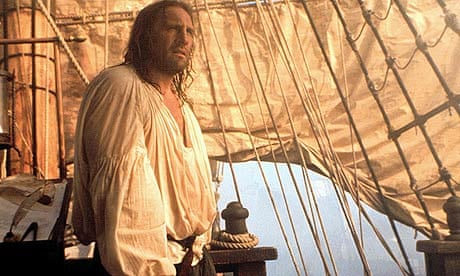Director: Ridley Scott
Entertainment grade: D
History grade: D–
Christopher Columbus sailed west from Spain in 1492. Though Norsemen settled in north America 500 years earlier, he is often said to have begun the European "discovery" of the Americas.
Geography

Columbus (played by Gérard Depardieu, lazily) is sure that the world is round, but the court rejects his proposal for an expedition. His dignified response consists of shouting "Raaaargh!", throwing his papers around and falling over a table. After half an hour of this sort of thing, Queen Isabella (Sigourney Weaver) finally stumps up the cash, maybe just to get rid of him. Off he sails, pointedly using his quadrant to demonstrate that the screenwriter has read a book. "A mistake of one degree and we'll be out 600 leagues!" he exclaims. The real Columbus was a poor navigator, missing the 28th parallel by three whole degrees and falsifying the ship's log to con the crew into thinking they hadn't gone too far. (His estimates were usually wrong anyway, and the fake log is often more accurate than the real one he kept for himself.)
International relations

Some clouds roll back theatrically to reveal a palm-fringed Bahamian shore. Columbus sinks to his knees on the sand and renames the island San Salvador. He meets some of the locals. "We come in peace and with honour," he intones. "They are not savages, and neither will we be." Then he biffs off to Hispaniola to turn them all into slaves and steal their gold.
Location
On another trip – the film conflates Columbus's second and third voyages – he settles at La Isabela. It appears to be the Caribbean's first luxury spa resort, complete with billowing white linen curtains, ironwork chandeliers, sisal matting and thick clusters of church candles. Recent archaeology and history suggest that women and Africans were present on Columbus's early voyages, but no one has yet proven that he brought an interior designer. And it's tricky to square this with the real accounts of La Isabela as a filthy, poorly-situated camp with appalling sanitation, in which large numbers of Spaniards were ailing with tropical diseases as well as their own specially imported syphilis.
Violence

The film portrays Columbus as a heroic protector of the Tainos, the indigenous people of Hispaniola. In real life, he did have a sense of religious duty towards the Tainos' souls and said they should be kept well enough "that they do not rebel", but displayed no humanitarian feeling. During a famine, he ramped up the tribute of gold the Tainos were supposed to pay him. The colonist Miguel de Cuneo, an old friend of Columbus's, wrote a graphic account of his violent rape of a Caribbean woman "whom the Admiral [Columbus] gave to me" and cheerfully recorded his exploits murdering Taino men – none of which seems to have earned him so much as a slap on the wrist from the boss.
People

The film invents a bad guy, gloating aristo slime Adrian de Moxica – possibly based on Adrian de Mújica, who was involved in a revolt on Hispaniola. But the evidence doesn't suggest Mújica was evil. Nor was he known for dressing up as the dark-haired twin of Lucius Malfoy, though watching the big goth stagger around Caribbean beaches in his sweaty black and silver doublet is quite entertaining. It was Columbus who enslaved the Tainos (against Queen Isabella's judgment), and Columbus who instituted the harsh punishments Moxica doles out in the film. So 1492: Conquest of Paradise works best if you view it as 15th-century Fight Club, with Moxica as Columbus's Tyler Durden. Since some historians argue Columbus was mentally unstable – for instance, he convinced himself that Cuba was full of griffins – this interpretation is justifiable, though clearly not what the director intended.
Verdict
"The New World is a disaster," moans Queen Isabella. Yes, that's about right.
